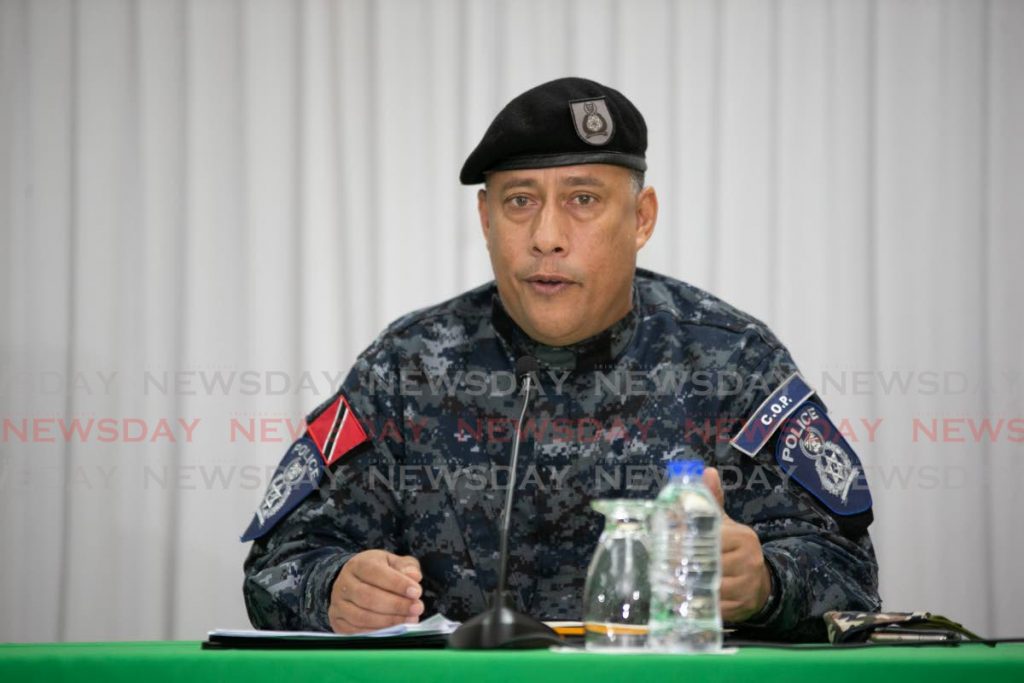CoP: No curfew free-for-all

After a massive influx of applications for curfew permits, Police Commissioner Gary Griffith has announced that only select organisations will be among those receiving them, in a bid to regulate movement while the state of emergency remains in effect.
He was speaking at the weekly police media briefing at the Police Administration Building, Sackville Street, Port of Spain, on Monday.
Griffith said since the state of emergency was announced on Saturday, he had received over 250,000 applications from people and organisations.
He asked organisations to be mindful of the curfew's purpose before applying for a permit.
He said among those applying were roti shops, vendors, accounting firms and ice cream parlours.
Citing the relative ease with which curfew permits were granted for the 2011 SoE, Griffith said under the new system, permits would be granted to organisations and companies, not individuals, to prevent abuse.
"What we have done to greatly reduce the applications is that I have only approved less than 5,000 out of those 250,000 (applications). Because what happened in the past is that if I work in the energy sector or in an essential service. I am going to ask for a curfew pass for every single employee in my company.
"Let's say Mr Chandler is working tonight, I am working tomorrow and DCP Christopher works the following night. When he has his pass, it allows myself and the DCP to ramajay on the streets, because we each have a pass. When I have to work, he will then ramajay, because he is off duty – and that is the problem."
As it is, since passes are being issued to the organisation, "You have a responsibility now to give that pass to those individuals, based on if it is mandatory for them to be on the streets after 10 pm (sic) to 5 am."
In fact the curfew begins from 9 pm.
Griffith also said among the applicants were several high-ranking business executives including CEOs, directors and chairmen, and reminded the public that curfew permits were not a status symbol but a serious responsibility. He warned that a pass could be revoked if found to be abused.
He also noted that unlike previous SoEs, the curfew would also apply to off-duty law-enforcement officers and workers from private security firms.
"Security officers have the audacity to believe, 'If I am a precepted (security) officer I can just show my security badge.' Yeah, you can. and then we will give you free room and board in a police station for the night.
"So no one can feel you can just show your card because you are working in the public sector, the security industry or a law-enforcement agency. Unless you are on duty, you have an obligation to stay at home.
"You will be stopped, you will be questioned and you can and may be arrested, based on what we find out."
Responding to a memo circulating that the National Agricultural Marketing and Development Corporation (NAMDECVO) would allow food markets to open at 3.30 am, Griffith said the curfew would also apply to vendors even though they were listed as essential workers.
Griffith said unlike previous SOEs, which were declared in response to a terrorist or criminal threat, the current situation was to avoid the spread of a virus. He implored the public to change their attitudes and behaviours to assist the authorities.
He said passes must be displayed on the upper or lower portion of windshields of the vehicle.
He also said that measures were put in place to ensure that passes could not be duplicated or forged.
For his part head of the police Legal Unit Christian Chandler also stressed that applications for curfew permits would be heavily vetted and reminded the public that there would be no free-for-all in the distribution.
Previous SoEs
In TT's history, states of emergency have been declared five times before.
The first was when army officers sympathetic to the Black Power Movement of 1970, led by Raffique Shah and Rex Lassalle, mutinied against their senior officers.
A year later, in October 1971, Prime Minister Dr Eric Williams declared another SoE in response to labour unrest. It was lifted on June 30, 1972.
The third was during the July 1990 attempted coup, when Yasin Abu Bakr and Jamaat al Muslimeen insurgents stormed the Red House and TTT studios on Maraval Road.
The fourth SoE was declared by Prime Minister Patrick Manning to remove Speaker of the House of Representatives Occah Seepaul in 1995.
In the most recent instance, Prime Minister Kamla Persad-Bissessar announced an SoE in 2011 in an attempt to clamp down on criminal gang activity. This led to over 1,000 arrests, including those of people who were alleged to have plotted the assassination of Persad-Bissessar and members of her Cabinet. The State ended up being ordered to pay hundreds of thousands of dollars to detainees for wrongful arrest.
People who don't need curfew permits include:
Healthcare workers (nurses and doctors): owing to the large number of healthcare workers, nurses and doctors will be required to show their ID badges if stopped by police
Utility workers in marked vehicles. (ie T&TEC, TSTT, WASA).
People who have a late-night or early-morning flight can show officers their ticket with the flight time if stopped.
People going for emergency treatment: police will escort those in need of healthcare to the hospital or health facility.


Comments
"CoP: No curfew free-for-all"